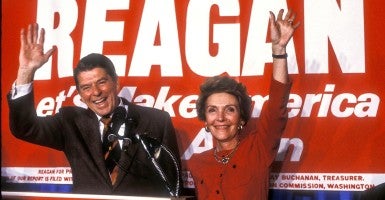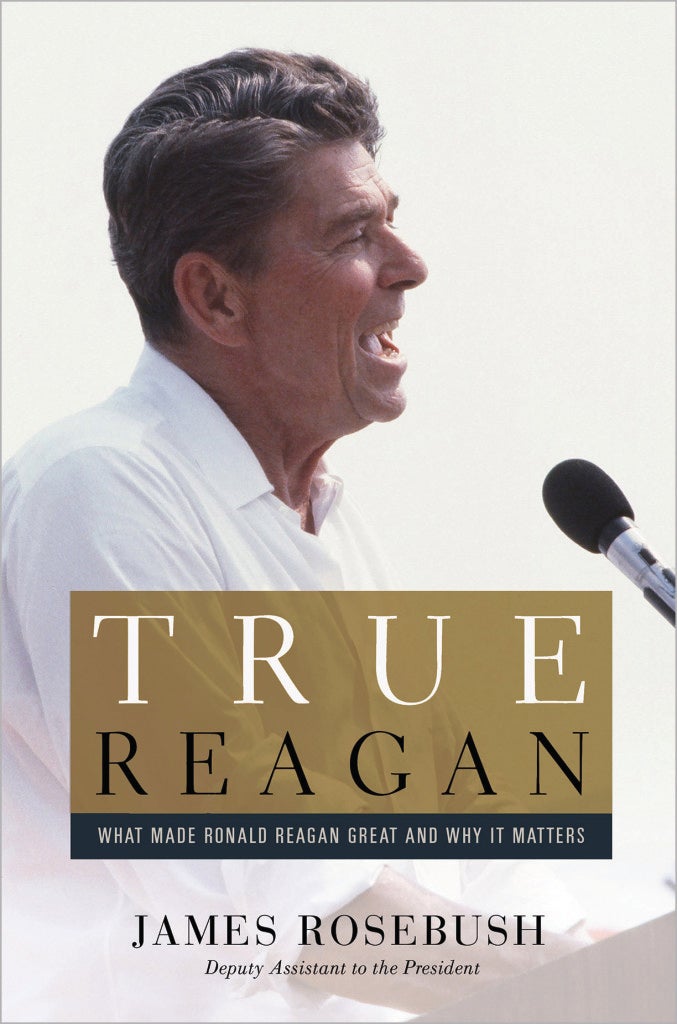He has been out of office for nearly three decades, and yet the name of Ronald Reagan is heard often today. Even as history fades and the precise details of his presidency become less distinct, many believe that the fortieth president of the United States would have answers to the complex and almost implacable issues we face today, or, at a minimum, he might have the bearing and strength of character to significantly improve global geopolitical conditions.
In our extraordinarily disruptive world, Reagan is recalled as a leader who could verbally wrestle global agitators into submission. Some people look for his character traits to be represented in the voices of today’s leaders. Few find them there.
In poll after poll, Reagan is referred to as a standard-bearer in leadership and communication. His public approval rating is higher now than when he left office. His overall standing has positioned him in the top ranking of those whom the public considers to be the greatest American leaders. This puts him in good company alongside George Washington, Thomas Jefferson, Abraham Lincoln, Franklin Roosevelt, and John F. Kennedy.
The force of his own personality and his acts as president were impressive enough to be enduring in the hearts and minds of American citizens. And yet we sense there is more to the man that we have yet to discover. Although Reagan is referred to in the media with regularity, I have also walked down city streets and been surprised to randomly hear people of all ages talking about Reagan—usually with some curiosity, typically with respect.
When I encounter strangers who learn I worked for Reagan, they typically want to tell me how much they respected him and they want to know more of what he was really like as a human being. They want to keep him alive and not have him become a mere historical statue on public display. It is almost as if they want to think of him playing a continuing role in a still-unfolding story of the America he loved so much.
>>> To Read James Rosebush’s New Book, “True Reagan: What Made Ronald Reagan Great and Why It Matters“
The plain reality is that Reagan is not alive today to unlock the secrets of how he achieved this iconic status in leadership and communication—nor is he available to propose a platform of legislative and policy proposals to solve the various problems in which the world has become mired in the post-Reagan era.
But then he never revealed his secret to achieving success in these disciplines while he was alive, either. He eschewed public introspection and confounded most anyone who attempted to decipher the source of his winning ways. Few realized that beneath that quiet demeanor was actually a brooding long-term strategist with a grand plan. He was willing to let people think what they wanted to about him.
Inside he was charting a course for himself and the world based on beliefs he established in his early life. He did not strive for personal popularity. He wanted American values to be popular. He attached himself to these values as if he were holding on to the horn of a saddle as he rode the uptick in public popularity because of his political horsemanship.
Few realized that beneath that quiet demeanor was actually a brooding long-term strategist with a grand plan.
It was a brilliant strategy that American leaders since Reagan have almost completely missed. It was his own genius. The Reagan way. Not found in any textbook, on any website, or in political training, and yet simple, direct, and accessible.
People have asked me: What would Reagan do if he were alive today—about one of the many fearsome trouble spots in the world? How would he handle these conflicts? What answers would he have? What kind of Oval Office speech could he give to make us feel better about the situation? How would he manage U.S. bilateral and multilateral relationships? How would he take control and exercise the strength required to deter aggression against the U.S. and our allies? How would he unite us rather than divide us?
The only reasonable answer to this type of speculation is to look back at his record, practice, and principles. From these we could discern that since Reagan proved himself a brilliant strategist—though he was not heralded as one while in office—a fierce competitor on the verbal battlefield, effective in developing and maintaining useful personal relationships with other leaders, and an eager delegator of responsibility, he would have a powerful response to contemporary challenges.
I believe Reagan would have offered a muscular deterrence to leaders who would encroach on the universal values he held to be most important and championed—individual freedom from oppressive and overreaching government control, and personal liberty. Whatever political leader and whatever system got in the way of these God-given rights, as Reagan saw them and referred to them, he targeted as the enemy or evil.
Yes, he protected Americans, but what’s more, his efforts were designed to help individuals suffering under totalitarian regimes anywhere in the world. The facts bear this out.
Reagan’s political beneficiaries are found in many parts of the world. Reagan loved America and believed in its exceptionalism, but he also wanted everyone in the world to enjoy what Americans do. He wanted the light from the “shining city on a hill” he believed America represented, to be shed around the globe. He knew that safeguarding and spreading democracy outside of the United States was the best way to protect Americans and the freedoms we enjoy. He never retrenched. He never yielded authority to anyone who did not operate in the best interest of the American people and American values. He loved his country and his countrymen too much not to keep them safe.
Since the time Reagan occupied the Oval Office, no one in American politics has been able to equal his oratorical ability and assume the mantle of The Great Communicator, as he was dubbed by the media. But earning this honor was due to more than being a mere thespian, effectively mouthing the sometimes grand and picturesque thoughts of others. Reagan wrote hundreds of his own speeches in longhand on yellow legal pads (which survive to this day), researched their content, and spoke from his heart and mind—long before there were any professional speechwriters on board. In actuality Reagan was the Great Communicator far before he moved into the “home above the store”—as he and other presidents have called the White House.
Starting in the early 1950s, Reagan was publicly explaining his vision for America everywhere he was invited and some places where he was not—most notably in Hollywood. His beliefs were not political contrivances suddenly concocted for his presidential campaigns. They were observable in his communications before he even dreamed of a run for the presidency.
His beliefs were not political contrivances suddenly concocted for his presidential campaigns.
People tend to think of Reagan as having had one career prior to reaching the White House—that of movie actor—and while that job experience proved useful in his ultimate and final position, it was in a much earlier homegrown role, growing up as the son of a preacher in small Midwestern towns, that gave Reagan his basic and most durable communication skills—as well as his personal principles.
He learned early to copy and adopt the oratorical skills of his mother, who was a substitute minister and small-town actor, and to a limited extent he also mimicked his father, who was quick with Irish humor as well as a ready and picturesque storyteller himself. Reagan developed his capabilities and ideals for leading and communicating at home growing up; over his lifetime, he expanded and refined them in his jobs as lifeguard, radio sportscaster, film actor, union organizer and leader, corporate spokesman, Las Vegas nightclub performer, and two-term governor.
What I have written is based on what I saw and heard during my days working for the Reagans. I am also sharing what the president revealed to me personally, face-to-face.
These one-on-one encounters shaped and informed my view of how he came by these strongly held beliefs or standards, as well as the uncommon courage to employ them boldly for the benefit of society. Until Reagan occupied the White House, the world had not seen these exact qualities in a twentieth-century statesman since Winston Churchill, nor have we seen them since. Like Churchill, Reagan’s story is all about his values and character: how he developed and tested them; how he suffered to establish them; and finally how he created, affected, and delivered governmental policy based on them—and thereby changed history.
Great leadership and communication carry and deliver a message and moral energy. The ability to achieve positive change is fundamentally dependent upon the values and character of the leader. Leaders are ultimately remembered by the effects or results of their work and the examples they leave behind. Often they are more completely understood after they leave office.
That was what happened to Winston Churchill who, despite having led England to victory in World War II and was shockingly turned out of political office at the end of the war, is now universally lionized for his outsized accomplishments, his soaring and inspiring oratory, and his character. But Churchill, a more colorful character who was in public service far longer, defined himself much better than Reagan through his prolific published writings, his thousands of public speeches that included personal reflections and professions of his own fears and vulnerability, and his leadership of the British to victory in World War II. Though born in a palace, Churchill lived a life of public service and was often accessible to the average man—especially during the war. As a result he has been comparatively easier for biographers to write about and the public to understand than Reagan—although even in Churchill himself there also remains a degree of mystery.
Reagan, with a much simpler résumé than Churchill, made himself more difficult to understand because he was not publicly introspective, was relatively colorless, largely scandal free, left few genuinely interpretative writings or interviews, and did not lead a nation into or through a great war. Yet even though much of his private personality remains unmined, his public standing continues to climb. The fact is that although few really understand Reagan from the inside out, he has become a standard against which other leaders are now compared—that is, he set a standard, in some categories, of an ideal American president.
Excerpted from “True Reagan: What Made Ronald Reagan Great and Why it Matters.” (Copyright 2016) Used with permission from Center Street, a division of Hachette Book Group, Inc.
































